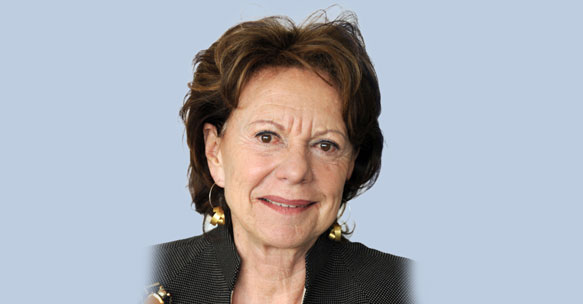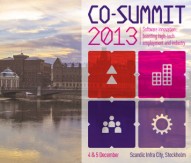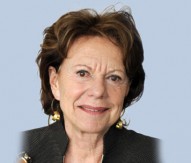
Digitising our future
The HUBFORUM is the digital rendezvous for digital innovation. Taking place in Paris earlier this month, 1,000 delegates composed of digital experts, decision makers and journalists join together to expose the latest digital trends. The two-day conference is supported by both global technology and telecommunications leaders, including Microsoft, Adobe and Orange.
Addressing delegates, Neelie Kroes, Vice-President of the European Commission responsible for the Digital Agenda, informed her audience that ICT and the wider digital economy were key to Europe’s future economic growth.
“Because digital helps us innovate, grow and create jobs; digital tools, technology and talent. The ICT sector itself is large and growing. This can help business in every sector innovate and improve, boost performance and productivity.”
The Vice-President outlined the significant competition Europe was facing from companies abroad, particularly from the United States, which consequently has “serious implications for our economy and…our privacy”. She outlined how European digital innovation leaders were losing their competitive edge and how the continent was suffering from a brain drain. However, the Digital Agenda, she said, would help provide important remedies and support growth.
“We must support European entrepreneurs. As it stands, they don’t have the recognition, the rules or the resources. Recognition that this is not just a valid career choice, but key to our future. I welcome that the French Government is seeing the importance of venture capital, something all start-ups dearly need. It’s time to start supporting those essential resources, not stand in their way.”
Manifesto
Kroes highlighted the Startup Manifesto, a documented devised by the Startup Leaders’ Club, to encourage entrepreneurship and innovation in Europe to the benefit economic growth. The Startup Leaders’ Club was created by the Vice-President to provide guidance on strengthening the European business environment for web entrepreneurs. She continued by detailing the obstacles that both entrepreneurs and industry face.
“I don’t want us to be the US. We don’t need to dig a new Silicon Valley over here, and we shouldn’t try. Yet I do think we could learn from them, celebrate risk and support innovation.
“We need to support the digital ecosystem by investing in key areas. Supporting European excellence in fields like electronics, new 5G technology, or the big data on which sectors from retail to transport are coming to rely – that’s what we’ll be doing through Horizon 2020, by removing all the obstacles that stop online services working across borders.
“European innovators don’t have easy access to a single market. In the US, you can easily share, spread and sell your idea to a market of hundreds of millions. While in Europe, you must deal with many different rules and standards, a fragmented tangle – from payment systems, to cloud standards, to copyright and licensing, to how you identify yourself online. Put those obstacles together, and it’s often far harder to trade online than in the real world. Bring them down, and we are giving our economy a real chance.”
Telecoms
Kroes emphasised the need for further development concerning telecommunications, supporting international competitiveness. She emphasised the importance of developing faster broadband and spreading 4G communications.
“We won’t get every European digital without a strong, healthy telecoms sector, one that benefits from the single market boost. Today we don’t have that. Operators find it hard to work between countries, to offer seamless connectivity and get economies of scale. Mobile users face poor connections, blocked services and unfair charges. That has an impact on the whole digital economy, and beyond.
“We must bring down the barriers that plague those networks. A modern, thriving telecoms sector cannot be built on roaming, excessive call charges or throttled services. With fewer obstacles, fairer prices, and the economies of scale for innovation and investment. For broadband that doesn’t stop at the border.”
Regulation
The Vice-President identified the need for a greater convergence regarding regulations, over-the-top services and taxation, as well as “a level playing field” for fair competition.
“We won’t get where we want to go simply by levelling down: by making it harder for internet innovation to flourish in Europe; by standing between Europe’s citizens and the online tools they love; by applying more burdensome regulation when you could be ensuring the competitive markets where regulation can be lifted.
“We won’t get there just by new taxes or new restrictions on restructuring – neither for telecoms nor any other digital sector, but rather by supporting new business opportunities like the internet of things, cloud computing and big data, and by allowing companies to adapt how they operate accordingly. We will only get there with a healthy telecoms sector, able to invest and innovate.”
Kroes concluded by outlining her ambitions to reduce barriers, develop a new single market and assist Europe’s pioneering digital entrepreneurs and businesses.
“The EU is about bringing down borders. It’s time we did that for the online world too, an open environment supporting the open Internet. Let’s build a vibrant European ecosystem, one where European ideas can grow, flourish, and spread; one where innovators start in Europe and stay in Europe.
“Let’s ensure the connectivity to provide innovative services over fast networks; let’s bring down barriers and invest in the future.”




